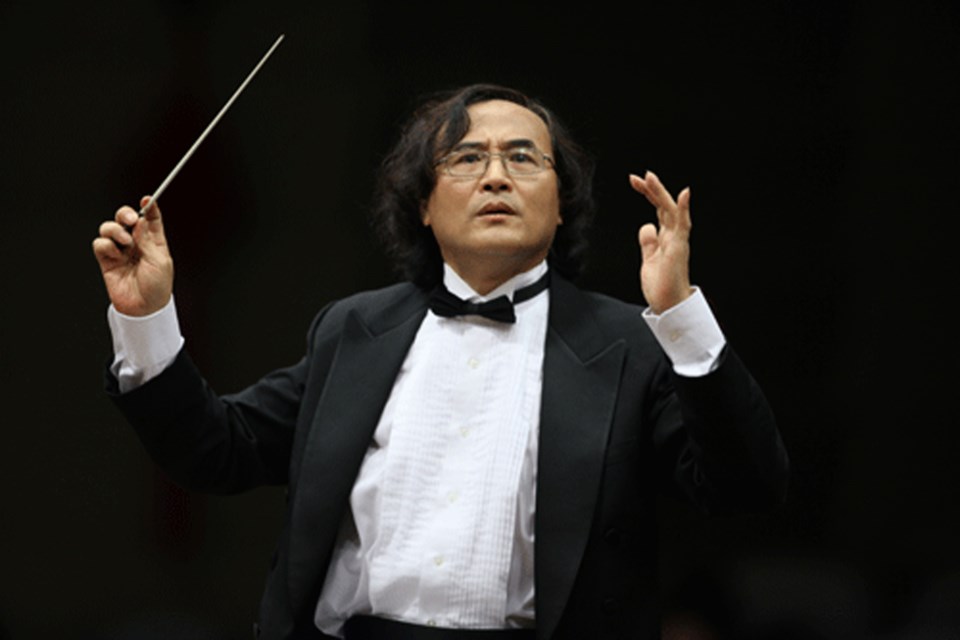Jin Zhang can remember when the Chinese music scene in Vancouver was nearly invisible - when just a handful of amateur musicians would get together in Chinatown to perform on their traditional instruments.
These days, professional Chinese music is thriving - so much so that it has inspired a new festival celebrating Chinese music in all its forms.
The Sound of Dragon Music Festival runs May 9 to 11 in Vancouver, with lead-up events in the preceding week - including a kick-off concert at the Shadbolt Centre here in Burnaby on May 5.
Zhang is one half of a Burnaby couple - with partner Jun Rong - that's involved in the festival.
Zhang may be best known to local audiences as the conductor of the New Westminster Symphony Orchestra, but he's also an acclaimed composer and conductor of the VBC Huayi Music Production Choir.
The festival will feature three world premieres of Zhang's compositions.
The Vancouver Inter-Cultural Orchestra - which is co-presenting the festival - will be premiering a new arrangement of one of Zhang's pieces in the opening Friday night concert May 9. Originally composed for trio, it's been arranged for full orchestra with percussion soloist.
Another of his pieces will be performed by the duo of Rong and harpist Lani Krantz in a Saturday concert.
Zhang will also take to the stage as conductor of the choir - a performance that will feature another premiere of his work.
He laughs that, as a composer, the hard work is behind him now - and he can sleep again.
When he's in the middle of working on a new piece, he says, that's not the case.
"When you wake up, immediately your mind will go to your music," he says.
He's pleased to be showcasing his work with the choir.
"The choir is very different from other choirs," he says, noting it specializes in Chinese folk songs, with some acting and costumes. "Most of the works are from my arrangements."
Rong, meanwhile, will bring her skill on the erhu - for the uninitiated, a traditional two-stringed instrument - to the stage in both the concert with harpist Lani Krantz and as a guest musician with a Taiwanese orchestra that needed extra players to fill out its ranks.
Both are pleased to be taking part in the festival to share their passion for Chinese music with the city at large.
Zhang notes that the Chinese music scene has changed a great deal since left China for Vancouver in 1990.
"The community for Chinese music was very little," he says. "There were no professional players, only community players."
Which meant, he notes, that the general public wasn't exposed to the real capabilities of the traditional Chinese instruments.
But, as the political situation in China - and then Hong Kong and Taiwan - drove emigration to new heights, professional musicians started coming in larger numbers.
"People started to realize that these instruments can do much more than they thought," he recalls.
He points out that Chinese folk music is different from that of nearly any other country in that all its musicians study in serious music schools.
"Folk musicians in other countries, they don't really study in music school," he points out.
Zhang, a native of Beijing, first studied at the Central Conservatory of Music in Beijing. He started out playing piano and erhu - he really likes to write for erhu, he notes, since he has played it for so long - but later changed his focus to conducting.
He spent two years studying in Japan, having a chance to learn from masters Kazuyoshi Akiyama and Seiji Ozawa.
He says he was fortunate to make connections fairly quickly once he moved to Canada. He found the New Westminster Symphony Orchestra in 1993 when they held auditions for a new conductor - a post he won and still holds some 21 years later.
He notes that he and others who arrived in Canada at around the same time helped to establish a Chinese music community - so that when Rong arrived a decade ago, it was much easier to establish herself.
"I think I'm lucky," says Rong, who moved to Canada because a friend did, and because she wanted to try out a new kind of life.
She, too, is formally trained - she began playing the erhu at age nine, under the tutelage of her father, who was a professor. By age 12 she was studying at the conservatory in Beijing, and she forged a career as a performer and teacher.
She's grown as a musician since coming here, she says, because she's been able to meet musicians from many other countries, playing styles of music she had only ever seen on TV.
"Here I can play with real musicians from different countries," she notes.
She's in demand as an erhu teacher, and she says the instrument itself is growing in popularity.
Zhang notes with a laugh that they don't have to explain what the erhu is nearly as much as they used to.
"Now we don't have to say, 'it's a two-stringed Chinese violin,'" he says. "Erhu is pretty popular."
He points out that, of all the traditional Chinese instruments, it's the most accepted in Western music - even well-known film composer John Williams has incorporated it into his movie scores.
Local audiences will have a chance to experience the full diversity of Chinese music in the Sound of Dragon Festival, which will showcase everything from ancient to contemporary music, jazz and world fusion in solo, chamber and orchestral performances.
There's a preview concert on Monday, May 5 at 7:30 p.m. at the Shadbolt Centre for the Arts (see www.vi-co.org for details), and the festival opens Friday, May 9 at the Roundhouse Community Arts and Recreation Centre in Vancouver. Check out www.soundofdragon.com for all the festival details.



